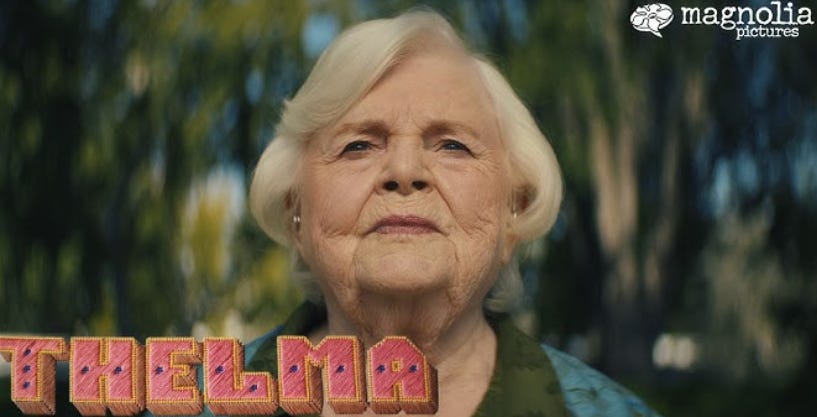The New Movie "Thelma" Just Scoots In to My Recommend-Film List
This 2024 movie both parodies action films and sentimentalizes about aging and generational problems
It wasn’t even a month ago when my wife got scammed. She got one of those text messages that claimed that her package wasn’t going to reach its destination unless she replied immediately. Without thinking, she gave the texter-scammers her credit card.
She caught it right after it happened, yet we know it’s going to happen again. These days, everything in telecommunications is a scam until proven otherwise.
With that real-world problem in mind, the recently released “Thelma” hits home, and it adds the obvious fact that it’s American seniors who are the most preyed-upon group, because as the stereotype goes, they don’t know how to use a cellphone or laptop. In “Thelma,” the main character can barely figure out how to close a pop-up ad.
She’s 93, living alone, two years removed from being widowed. Her loving grandson visits her regularly. His parents think she might need to go into an assisted-living residence.
But this main character is played by June Squibb, whom veteran moviegoers will know from all kinds of fine films, including “About Schmidt” and “Nebraska.” Remarkably, the 90-something Squibb stars in “Thelma.” I don’t know how she did it, since all the older people I know would feel exhausted after a long day, let alone an entire movie shoot.
In the film, Thelma herself gets scammed, to the tune of $10k. Desperate to get the money back, she embarks on her own quest to find the scammers. This involves a bit of light-hearted conning of everyone, grandson and daughter included (the daughter played by the always excellent Parker Posey). One scene involves Thelma stealing a friend’s scooter. Another displays her resourcefulness in procuring, from another acquaintance, a loaded gun.
“Thelma” therefore plays as a revenge-quest film, appropriately ending at night, the kind of movie time when trained hunters like Charles Bronson and Keanu Reeves would seek out and destroy the men who wronged them. This is all a fun joke in the movie — sometimes it’s whimsical, sometimes parodic, and sometimes I found it too patronizing of the elderly type that Thelma represents.
That tonal register — from whimsy to parody to serious sentimental syrup — means that I can’t possibly predict your exact reaction to the movie. “Thelma” wants to parody “Mission Impossible,” with the 60-year-old Tom Cruise as the key inspiration for Thelma’s nighttime hunt, and yet it always wants to *say something* about how we treat the elderly and how patronizing and helicopter parents are harmful, or something.
Whenever characters made speeches about their feelings, I yawned. But I also laughed an awful lot, enough to give this 95-minute film a mild recommendation. I’d almost call it a “no-risk” movie for most people: one that’s short, relatable, and sometimes clever. I wouldn’t mind re-watching it with my own teenagers.
Consider the scene where Thelma, having located the scammers’ main office, has to figure out how to get through a cluttered antique store. We’ve already seen her fall once in the movie, which has played up endlessly the problems that the elderly have of just getting around.
With the help of her friend, an elderly black man who acts as the sidekick in this adventure, Thelma uses the high-tech device she’s a whiz at deploying: her hearing aids. And then she’s off, Tom Cruise in Mission: Impossible style, snaking her way around lamps and over beds.
That’s far from the only humorous gag here, as the ending involves Thelma’s attempt to use a computer to make a bank transfer. If you’ve ever seen your mother, grandmother, or great aunt have problems with her Mac or PC, you will know exactly how this e-transfer might go for her.
I said “gag” above, but “Thelma” never does go all the way into an “Airplane” like parody. Thelma herself could be real. The end credits depict Josh Margolin’s (the writer-director’s) own grandmother as a direct inspiration for his main character. I get the sense that Margolin wants us to know that Thelma’s dilemmas are not only coming for his audience, decades hence, but they are real for just about everybody over 70 in the world.
Since everybody has or has had grandparents, everybody knows this.
Thus the combination of situational relatability and movie parody mean that “Thelma” might be watched on the personal or the meta level. The film seems pitched towards Gen-Z or late-millennial, with the overbearing Gen-X parents using surveillance devices to monitor their 24-year-old son as much as Thelma is monitored by the entire family. I would like the film to be less referentially goofy, but you can’t have everything.
And Thelma’s scam is all too real. As I said, I just dealt with one scam. What happens when I get older? It only takes one time to believe the wrong person in the wrong moment to turn into a Thelma. Thankfully, for “Thelma,” if you are alive, you aren’t as helpless as everyone makes you out to be.






